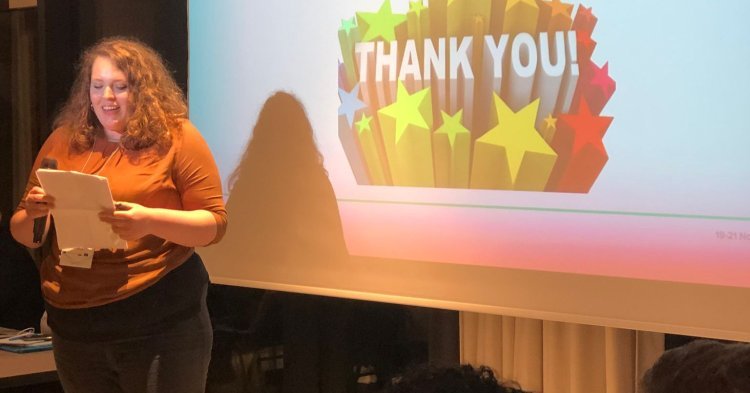In sight of the XXVI Congress of JEF-Europe, that will take place in Liége, Belgium, on 19-21 November 2021, the newly appointed Editors in Chief of the TNF, Elsie Haldane and Jacopo Barbati, interviewed the outgoing President of JEF-Europe, Leonie Martin.
TNF: Hi Leonie, and thank you for joining us. Our first question would be about how you think JEF has changed during your mandate, what has JEF undergone in the last two years?
LM: If you refer to the last two years, although I have been in the [JEF-Europe’s] Board for the last six years, I would say that on one hand, obviously we went through the pandemic; or we are going through the pandemic, to better say. I think that we had to identify how adaptable we are, and resilient at the same time; community aspects of the organization have been highlighted: being there for each other as such. I am very proud of the organization surviving this so far; I know about other organizations where people were giving up, because during a pandemic, you know, you question everything, you reflect a lot, and you might re-prioritize your life. People might have done that, but JEF seems to still be part of their lives.
Likewise, what we have seen is that a lot of local sections, a lot of regional sections as well, have been taking up more contacts, more twinnings [were established] as some sections definitely needed help and support, and we are actually quite happy that in this period, where everything was stuck, we now have a handful of interest groups, i.e. people who say “I really want to be in JEF but there is no section in my country’’ and so they are setting up the section basically now. Therefore, what we will see at the European Congress is that we will have JEF-Romania applying for full member status, but also JEF-Hungary, JEF-Ireland, JEF-Luxembourg going for candidate status; and there would be even more that will be ready, I am sure of it, if they will keep on going. I think that this is very special; I mean, it is always special, under any other circumstances, but particularly during a pandemic.
Another aspect is inclusion and safe space; these have been discussions going on a lot in the past two years and I think we have done a lot: there is a discussion culture that has been developing in JEF, and I am happy to see, to acknowledge that. When Black Lives Matter was happening in the US, and in Europe as well, we had some reflections on what it means; sometimes people misconfuse our organization for a sort of nationalist organization where we are trying to be just “Young Europeans”, trying to set up European nationalism. That is not true, therefore we set up a communication campaign called “Be a federalist ally”, to talk about what it is, what kind of Europe we have, what kind of Europe we want.
Finally, we have been very active in shaping the Conference on the Future of Europe: we have been engaging with a lot of people, we made sure that other civil society organizations care about this process, we made sure that politicians know that we care a lot about this and that they should take this seriously as well. Obviously there is still room for improvement within the Conference on the Future of Europe and around it, but I won’t say at all that this is our fault: we have been pulling all the weight we have on European level but also in an even more coordinated national advocacy level, since we understand that the European political system needs national based campaigns as well.
TNF: You were mentioning earlier that you have been involved in JEF-Europe’s Executive Board for six years, so could you please elaborate a bit more on which you consider to have been your, or the boards’ you have been part of, biggest contribution in these six years?
LM: In the last six years we have been working together, in a team effort, quite a lot to professionalize the organization. Perhaps some people remember that ten years ago there has been quite a lot of discussion and conflicts within JEF and a lot of measures have been taken to make sure that we know how to talk to each other and how we could also move together as an organization, and I think that the past six years have gone precisely in that direction as well, and even more.
I think that there is a clearer understanding on how we do EU lobbying - this is something that is even more targeted while we have campaigns, while we have a policy officer, while we have a communications officer helping us on social media: that is also a field where we have become more strategic.
We have managed to hire good people: if you think about the role of Secretary General, Valentin Dupouey for instance. He managed to get good operational grants, like the “Europe for Citizens”; but also if you think about Milosh Ristovski, who is now at his second mandate as Secretary General.
This organization has gone from an office with one Secretary General and perhaps one intern to an office with 8 people - and an office dog, let’s not forget!
You can tell that we were able to organize more capacity trainings, very strategically; we tried to look out for sections that are a bit weaker or sections that are right now starting out to see what kind of skills they would like to improve upon and how we can help them.
Now we are also better in matching projects with our political goals, so everything now is part of our political strategy. Why are we doing “Europe at school”? We are doing this because only if people understand how the European Union works, how Europe works, then we can have a discussion about the European federation. Why are we doing simulations of the European Parliament? We are doing this because people need to understand what are the duties of the Members of the European Parliament. Likewise, why are we doing cultural events, for instance, in some cities? That is because people need to have an understanding of European culture, of a shared sense of identity.
I therefore think that this professionalization and this strategic thinking have shaped the past six years quite a lot, and this was possible of course also thanks to the work of the previous two Boards, with Christopher Glück as President; and I think we have been able to continue that way and put our twist on it in the past two years.
TNF: You have done an impressive job, but of course there is always room for improvement. What do you think that it is still needed for JEF to improve on in the near future?
LM: There is always room for improvement, and it needs to be like that, otherwise the organization does not live on, and especially if we consider that the motto of our organization is “Simply a generation ahead!”.
I think that we can get better at internal communication, I think that we can also get better at creating more diversity within our membership. We are getting better at it, but we need to know how to use what language when: the vocabulary needed to discuss politics is very good when we talk with politicians or when we talk with organizations when we need to be taken seriously as political stakeholders; however, many of our members are Political Science or Law students, so we might not realize that this could discourage people from different backgrounds from joining us.
What I would like people to do, especially in the next two years, is to see JEF as a playground, and to check what kind of skills and competence anyone has or wants to develop, and try to figure out together how everyone can contribute to our political strategy.
Moreover, sometimes local members do not know what the European level is doing and likewise the European level might not know exactly what the local levels are doing; therefore we have something to improve about this aspect too.
I think that we can still grow in certain Countries: we need to do more advocacy in Eurosceptic Countries specifically because I think that this is where the battle needs to be fought. If we manage to get Copenhagen and The Hague convinced of European reforms, then this could be discussed inside the European Council and unfortunately at the moment this is still needed.
We can still get better in winning over the public: I think that at the moment, we are at a good point, compared to what I had heard 11 years ago, when I started getting involved in JEF. Back then, people were still having trauma over having lost the constitutional referendum [in France and the Netherlands in 2005, ed.]. I think that now we are very close to that historical momentum again: people seem to agree that European foreign policy is not working and there is more public attention on the fact that this has to do with unanimity. There are also other issues as well: people are still hung up a bit with the European elections, the fact that the Spitzenkandidat was not elected as President of the Commission.
These are things we can, and should, work with; also in the framework of the Conference on the Future of Europe that I think is going to determine quite a lot in the next two years, and then everything will be about the preparation of the next European elections and we need to give our best.



Follow the comments: |
|
